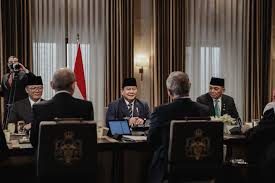In April 2025, Indonesia and Jordan solidified their commitment to mutual growth and regional stability through a series of bilateral agreements. These agreements encompass various sectors, including agriculture, defense, education, and religious affairs, reflecting a comprehensive approach to strengthening Indonesia-Jordan bilateral cooperation.
Strategic Agreements Enhancing Bilateral Relations
The recent diplomatic engagements between Indonesia and Jordan have led to the signing of four significant memorandums of understanding (MoUs), each targeting a specific area of collaboration:
- Defense Cooperation: An agreement between Indonesia's Ministry of Defense and Jordan's Ministry of Foreign Affairs aims to enhance military education, defense industries, and humanitarian coordination.
- Agricultural Collaboration: The Ministries of Agriculture from both nations have agreed to share expertise and technology, particularly focusing on tropical commodities and sustainable farming practices.
- Educational Exchange: A partnership between Indonesia's Ministry of Religious Affairs and Jordan's Ministry of Higher Education and Scientific Research seeks to promote academic exchanges and joint research initiatives.
- Religious and Waqf Affairs: An MoU between the respective ministries addresses cooperation in managing religious endowments and promoting interfaith dialogue.
These agreements signify a deepening of Indonesia-Jordan bilateral cooperation, aiming to foster mutual understanding and shared prosperity.
Joint Support for Palestinian Independence
Beyond bilateral interests, Indonesia and Jordan have reaffirmed their unified stance on supporting Palestinian independence. Both countries advocate for a two-state solution and have actively participated in international forums to promote peace in the region. Indonesia's recent initiatives include offering temporary shelter to Palestinians affected by the conflict in Gaza, demonstrating a commitment to humanitarian assistance.
Jordan, sharing borders with Palestine, continues to play a crucial role in mediating peace efforts and providing support to Palestinian refugees. The collaboration between Indonesia and Jordan in this context underscores their dedication to regional stability and human rights.
Agricultural Innovation and Knowledge Exchange
A significant aspect of the Indonesia-Jordan bilateral cooperation is the focus on agricultural development. Indonesia seeks to learn from Jordan's advancements in agricultural technology, particularly in areas such as water-efficient farming and desert agriculture. This knowledge exchange aims to enhance food security and promote sustainable agricultural practices in both countries.
The collaboration also opens avenues for joint research projects, training programs, and the development of innovative farming techniques suitable for varying climates and terrains.
Educational and Cultural Exchanges
The MoU on educational cooperation facilitates student and faculty exchanges, joint academic programs, and collaborative research initiatives. Such exchanges are expected to enrich the educational experiences of participants and foster cross-cultural understanding.
Additionally, the agreement on religious and waqf affairs promotes dialogue and cooperation in managing religious endowments, preserving cultural heritage, and encouraging interfaith harmony.
Defense and Security Collaboration
The defense agreement between Indonesia and Jordan aims to enhance military training, share intelligence, and collaborate on peacekeeping missions. This partnership is particularly relevant in addressing common security challenges and contributing to regional peace efforts.
Future Prospects and Regional Impact
The comprehensive nature of the Indonesia-Jordan bilateral cooperation sets a precedent for multifaceted international partnerships. By addressing various sectors, the collaboration not only strengthens bilateral ties but also contributes to broader regional stability and development.
As both nations continue to implement these agreements, the anticipated outcomes include enhanced economic growth, improved educational standards, advanced agricultural practices, and a unified approach to regional peace initiatives.
Read More






 Thursday, 12-02-26
Thursday, 12-02-26







